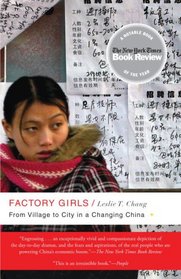R E K. (bigstone) - , reviewed Factory Girls: From Village to City in a Changing China on + 1436 more book reviews
Helpful Score: 2
This is a novel one can spend hours contemplating. The development of factories in China is often compared to our own Industrial Revolution. It is similar yet different in many ways some of which are cultural, some of which are born of necessity. It's fascinating to follow the migrants who move into the cities from their rural origins.
The author discusses migration of young women from the countryside to the city where they seek jobs in the factories in Dongguan. She tells stories about several individuals, some she loses and some she keeps as friends. She quickly loses Yongxia and Dali among the thousands seeking work. Min becomes almost a friend. Many young women like Min job hop, attend classes, look for love and hope for better jobs and more money but are often taken advantage of by others.
To understand these young migrants one must know a little about the factories themselves. "It takes two hundred pairs of hands to make a pair of running shoes." Thus begins the chapter describing Yue Yuen, a factory where shoes are made. The author describes the factory itself, its conditions and talks to workers. Self-improvement is a way of life for many of them. It's how the differences between the young migrants and their families begin. Many have little education and expect to learn on the job. Falsifying qualifications, age, and experience is common.
At some point after "going out" (working in factories) young migrants begin to seek mates. The author attends meetings of a club to aid the process. It is poorly operated. She meets Wu Chunming with whom she spends a good deal of time, trying to understand how she will find a husband. She reconnects with Min who takes her to her parents' home for two weeks over the Chinese New Year.
There is so much information in this book that I can only relate a few instances of my impressions. When the author switches tactics to pursue her Chinese heritage background, she discovers much about her family, how they suffered during the cultural revolution and how they scattered across the country and to America. She learns that the family histories which survived the cultural revolution extend for hundreds of years beginning with the migration of the first ancestor but many have been destroyed. Fortunately, hers was saved by a family member who became obsessed with what happened. Within the final pages of this investigation she links her discovery to the stories of Chunming and Min, the migrant girls she came to know best during her research for this novel. It's a read I recommend to those who wish to learn more about this vast country and its people.
The author discusses migration of young women from the countryside to the city where they seek jobs in the factories in Dongguan. She tells stories about several individuals, some she loses and some she keeps as friends. She quickly loses Yongxia and Dali among the thousands seeking work. Min becomes almost a friend. Many young women like Min job hop, attend classes, look for love and hope for better jobs and more money but are often taken advantage of by others.
To understand these young migrants one must know a little about the factories themselves. "It takes two hundred pairs of hands to make a pair of running shoes." Thus begins the chapter describing Yue Yuen, a factory where shoes are made. The author describes the factory itself, its conditions and talks to workers. Self-improvement is a way of life for many of them. It's how the differences between the young migrants and their families begin. Many have little education and expect to learn on the job. Falsifying qualifications, age, and experience is common.
At some point after "going out" (working in factories) young migrants begin to seek mates. The author attends meetings of a club to aid the process. It is poorly operated. She meets Wu Chunming with whom she spends a good deal of time, trying to understand how she will find a husband. She reconnects with Min who takes her to her parents' home for two weeks over the Chinese New Year.
There is so much information in this book that I can only relate a few instances of my impressions. When the author switches tactics to pursue her Chinese heritage background, she discovers much about her family, how they suffered during the cultural revolution and how they scattered across the country and to America. She learns that the family histories which survived the cultural revolution extend for hundreds of years beginning with the migration of the first ancestor but many have been destroyed. Fortunately, hers was saved by a family member who became obsessed with what happened. Within the final pages of this investigation she links her discovery to the stories of Chunming and Min, the migrant girls she came to know best during her research for this novel. It's a read I recommend to those who wish to learn more about this vast country and its people.




